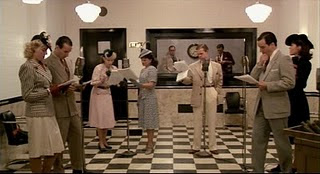
The high, growing audience demand for a new mass medium for receiving news, entertainment, and education heavily popularized the use of the radio in the 1920's.
The factor of audience demand works in a fairly, easy-to-understand matter. It's just like the concept of supply and demand. Whatever the audience wants, and is willing to consume, that's what the media will supply in return. The more and more the audience would tune into soap operas and other talk show varieties, the radio industry would supply more shows to the audience. As radio popularized more, companies would advertise more heavily via radio because they knew that the audience would be tuned in. The functions of radio responded to many needs that America needed in the 1920's.
The population has a never-ending, growing need for immediacy, entertainment, educational information, and current news. The radio provided all of these bases, and in fact, joined together all ages, classes, races, and generations into one common culture. They all shared very similar feelings and emotions that were produced as a result from what they heard on the radio. The radio didn't have geographical boundaries that would limit the spread of information, so everybody had such easy access to it! The audience demanded more and more of the radio; People wanted to tune into their favorite talk shows, soap opera dramas, music, and advice shows. Other industries and departments began to turn to the radio to advertise their own products and businesses. The high audience demand for more radio only further popularized it, and helped make the radio the most common form of media.

In Woody Allen's Radio Days, we see that as radio became an outlet for the obtaining of mass media in American society in the 1920's. The film showed us that people of all classes, ages, and generations listened to the radio collectively (such as when the young girl fell down the well.) Similar feelings arose all through out the nation. The news was immediate, and joined a nation together. The country wanted to be further be joined together as one, and the radio fulfilled that demand.
http://alsolikelife.com/shooting/2009/01/949-91-radio-days-1987-woody-allen/
http://www.thepunch.com.au/tags/radio/
Harvard College or university; Hopkins, May Grams. https://imgur.com/a/Kpl3fpE https://imgur.com/a/GfzEfYr https://imgur.com/a/OljSbLV https://imgur.com/a/KKzjrTr https://imgur.com/a/sbFsVuW https://imgur.com/a/R0aE8fl https://imgur.com/a/kZBUNzv
ReplyDelete